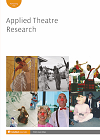- Home
- A-Z Publications
- Applied Theatre Research
- Issue Home
Applied Theatre Research - Current Issue
Volume 11, Issue 2, 2023
- Editorial
-
-
-
Editorial
More LessAuthors: Peter O’Connor and Kelly FreebodyThe five articles in this issue are all rich examples of research and practice that may not be perfect, but that strive to be ethically, politically and aesthetically powerful in considering the value of our work in the field of applied theatre and bringing about social change. There is a mix of research methods that supports our conviction that no one method should have automatic preferential status in our field. The voices are truly global, with articles from Italy, Spain, India and England.
-
-
- Articles
-
-
-
What can we learn from play? A comparative analysis of creative play and ‘playing along’ in dementia care environments
More LessIn this article, I explore play in dementia care settings, specifically two types: creative play (play that engages creativity and imagination) and ‘playing along’. Acknowledging debates on truth-telling in dementia care, I consider how engagement-focused approaches in dementia contexts employ play to encourage connection, communication and care. To do so, I explore the work of researchers and applied theatre creatives in two projects, the Playful Engagement and Dementia Project and TimeSlips, alongside the communication strategy validation therapy. Considering the relational qualities and use of play in all three, I ask whether, in dementia care settings, embracing the flexible way in which play deals with the divide between fiction and reality can, without harm, address the needs of individuals living with dementia.
-
-
-
-
Roles and micro-chauvinism in youth: A semiotic analysis of expanded theatricalities
More LessThis article analyses the implementation of a theatrical performance for the prevention of micro-chauvinism violence and the promotion of equality created by vocational training students and aimed at secondary school students. Using a qualitative research methodology based on case studies and the use of narratological and semiotic models of theatrical reception, this work focuses on analysing the acting roles of the characters who represent situations of micro-chauvinism in adolescence, and understanding the theatrical performative characteristics of the artistic work. The results allow us to draw conclusions about the advantages of theatre applied to education to diagnose the current situation of youth micro-chauvinism; the orchestration of teaching with a gender perspective through the dramatization of micro-chauvinism among young adolescents; and the choreographies of learning for the promotion of gender equality through theatre applied to education.
-
-
-
Can arts-based interventions reduce children’s peri-operative anxiety in paediatrics? A discussion of representative studies
More LessAuthors: Lars Harald Maagerø, Charlotte Grainger and Persephone SextouThis narrative literature review aims to provide a broad scope and objective analysis by identifying and summarizing published works surrounding the current research into how different forms of non-pharmaceutical and non-invasive arts-based methods can be used to reduce children’s peri-operative anxiety in paediatrics. While our search focuses on the peri-operative anxiety context, we build on wider research on the role of the arts in paediatrics and include representative studies from the last five to seven years. We highlight the most current findings in non-invasive interventions for hospitalized children, including primarily applied theatre performance in paediatrics followed by digital arts such as video games, virtual reality and music, to gain a better understanding of the current knowledge of how non-pharmaceutical and non-invasive arts-based methods can further be utilized in surgical procedures and treatments in paediatrics, how arts practitioners and hospital staff can better collaborate in such procedures and what further research is needed in relation to such methods for reducing peri-operative anxiety in children.
-
-
-
To perform or not to perform, that is the question: Drama activities and psychological wellbeing in adolescence
More LessAuthors: Vicente Alfonso-Benlliure and Tomas Motos TeruelThere is a substantial body of evidence on how important it is for adolescents’ wellbeing to engage in meaningful activities such as drama classes. The aim of this study is to assess whether the wellbeing and self-concept of young people who choose to take part in drama activities are significantly different from those adolescents who do not. A group of 198 subjects between the ages of 14 and 20 years participated in the study. The results showed some significant differences in certain wellbeing components – environmental mastery and personal growth – in favour of drama students. One of the most relevant results was the finding of important gender differences in the impact of drama experience on adolescents’ psychological wellbeing and self-concept. Drama girls showed higher levels of self-acceptance, environmental mastery and global wellbeing than non-drama girls. The study also revealed better academic, social and physical self-concepts. These results are discussed in terms of their educational implications in adolescence.
-
-
-
Pandemic, theatre and performance: Democratizing the subalterns through the Theatre of the Oppressed
More LessAuthors: Anirban Debsarma and Sreemoyee SarkarThe presented work analyses Theatre of the Oppressed (TO) methods impacting the pandemic. It follows the WHO timeline, when the COVID-19 pandemic had cast a dark shadow, making sustenance difficult for the marginalized section of Indian society. TO methods, though reflected, adapted and accommodated exhaustively in Indian applied theatre over the last four decades, offered a fresh, collective, democratic space during the pandemic. Forum theatre (FT) and legislative theatre (LT) praxis rendered a platform for activism, awareness and emancipation of the ‘subalterns’ during the pandemic. Thus, TO renewed psycho-social dialogue and critical, creative, experimental space during this time. The applicability of such methods facilitating social change is gauged using Boal’s ‘spect-actorship’ and Freire’s ‘conscientization’. The article looks forward to the TO signposts to serve as nodal points for further scholarly discussion and study on democratizing the disenfranchised population through FT and LT during the pandemic.
-
Most Read This Month Most Read RSS feed


